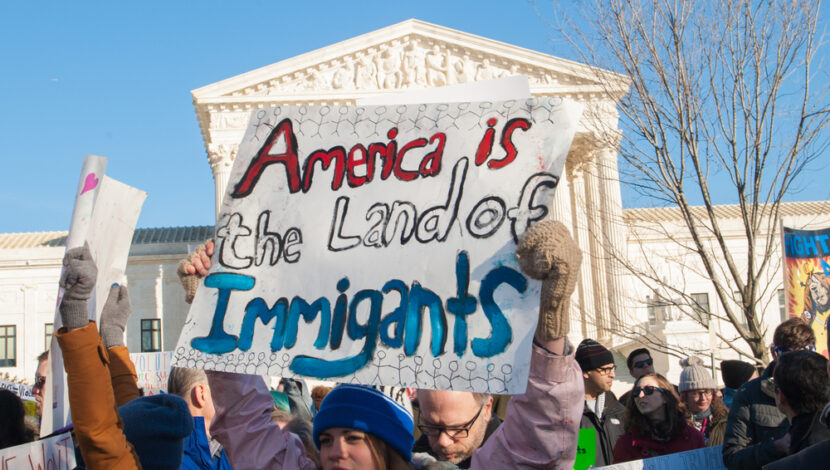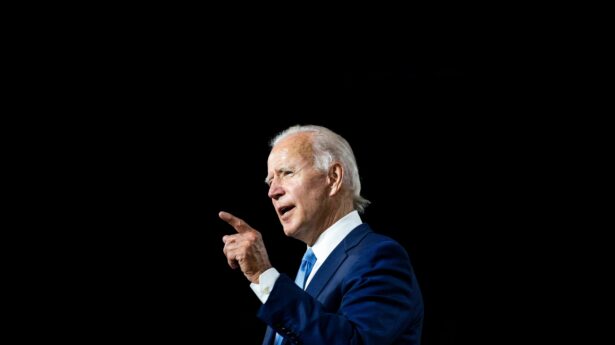The Unitarian Universalist Service Committee advances human rights through grassroots collaborations.
3 Reasons Trump’s Immigration Rhetoric Should Terrify Us

By Josh Leach on March 28, 2024
Earlier this month, the media spent days debating Donald Trump’s use of the word “bloodbath” in a recent speech. Was it a call for political violence—or merely (as his supporters contend) a prediction about the future of the auto industry?
Far less attention, though, went to Trump’s comments about immigration on the same day, even though these were perhaps even more extreme, and far less ambiguous. At the same rally, Trump described “some” asylum-seekers as “animals” and “not people.” And unlike the over-litigated “bloodbath” comment—no one can pretend this time that Trump was merely talking about cars.
After years of xenophobic rhetoric from Trump, of course, it’s easy to feel desensitized to his statements by now. The U.S. public is no longer surprised by Trump’s hateful comments about people in migration, and many have become inured to them over time. Recent polling suggests that Trump’s comments simply have less power to sway public opinion than they once did, no matter how extreme and vile they become.
These comments are more than just bluster and words, however—they have real-world consequences. Hard as it may be to overcome our feeling of numbness, then—after nearly a decade of Trump’s ugly outbursts in U.S. politics—there are at least three big reasons why we should still care:
- Trump’s anti-immigrant rhetoric is backed by concrete policy threats
It’s not only that Trump’s xenophobic rhetoric is openly designed to stoke hatred and resentment of people in migration—he’s also planning to use this hatred to implement real-world policy changes. Specifically, Trump plans to expand the immigration detention system and conduct a program of mass deportation targeting all 11 million undocumented immigrants in the country.
In a particularly disturbing twist, Trump has openly compared his policy ideas to an Eisenhower-era U.S. program that was named for a racial slur. This policy, originally implemented in the summer of 1954, was notorious for rounding up and expelling more than one million U.S. residents of Mexican ancestry from the country. Many of the people caught up in this dragnet were U.S. citizens falsely identified as undocumented immigrants.
Trump’s decision to invoke the legacy of this program therefore sounds an awful lot like an open call for racial profiling and discrimination against Hispanic Americans.
- Trump’s comments incentivize hate crimes
When a major party candidate uses his platform to describe asylum-seekers as “animals,” and to accuse people in migration of “poisoning the blood” of the country, it amounts to a call for violence and discrimination. Many extremists respond eagerly to this implicit green light for aggression.
In the most recent year for which data is available, hate crimes against Hispanic Americans surged to record highs, rising 21% in two years. Comments from politicians that seem to encourage and celebrate xenophobic hate will only exacerbate this trend.
This places U.S. citizens of Hispanic ancestry at risk, as well as recent asylum-seekers. As TV co-host Ana Navarro recently observed: Trump’s comments put “a target on the back” of everyone in the U.S. of Hispanic descent. “[P]eople who hate folks like that,” she remarked, “they’re not going to stop and ask you if you have a U.S. citizenship or a U.S. passport, they’re going to shoot first and then ask questions.”
- Stoking hatred against one group fosters hatred of others
Trump’s vile rhetoric against people seeking asylum taps into a web of interconnected extremist ideas placing all religious and ethnic minorities at risk. In recent comments, after all, Trump has increasingly repeated the conspiracy theory that his political opponents are bringing in asylum-seekers in order to throw the election. (In reality, only U.S. citizens can vote in presidential elections, and most recent asylum-seekers and parolees face long odds of ever securing permanent legal status, let alone doing so before November.)
In addition to being demonstrably false, Trump’s comments dangerously evoke the antisemitic “Great Replacement Theory”—a far-right extremist belief which accuses Jewish Americans of fostering immigration in order to “replace” the demographic composition of the United States.”
This false conspiracy theory has been used to incite hate crimes and mass shootings against Jewish people and other minorities in the United States. Yet, versions of it have gained increasing acceptance on the political right in recent years. Trump has repeatedly echoed versions of it, and right-wing influencers like Elon Musk have used their platforms to amplify the conspiracy theory, despite its overt antisemitism and the risks it poses to all minority groups in the United States.
***
These are just some of many reasons why we can’t afford to go numb to Trump’s incendiary comments, no matter how many times he repeats them. Outrageous as his words are in themselves, they are also more than just words—they put entire communities at risk, and may even threaten the future of our democracy.
Image Credit: Shutterstock (Rena Schild)

